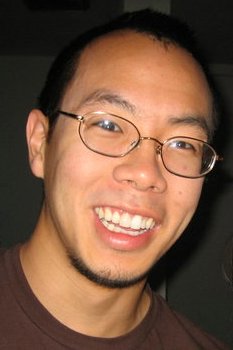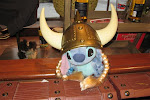[NOTE: Below is my Kermit speech, titled "The Rainbow Connection". I was working from the Competent Communicator manual, Project 3: Get To The Point. My personal goal for the speech was just not to freeze, like the last time... and a couple times before that.]
(sung)
"Why are there so many songs about rainbows
And what's on the other side?
Rainbows are visions, but only illusions,
And rainbows have nothing to hide.
So we've been told, and some choose to believe it.
I know they're wrong, wait and see.
Someday we'll find it, the rainbow connection.
The lovers, the dreamers, and me."That was a verse from the Academy award nominated song, The Rainbow Connection, from the 1989 film, The Muppet Movie. Today, September 24th, is the birthday of Jim Henson, the creator of the Muppets; he would've been 72 years old today. In his honor, I would like to tell you a little about his most famous creation, the singer of The Rainbow Connection, Kermit the Frog... about his origin, about his role in the Muppet family, and about his on-going influence in American culture.
Kermit's first appearance on television was in 1955, on Sam and Friends, Jim Henson's 5-minute puppet show that aired live twice daily on WRC-TV. That early version of Kermit was constructed from a ladies' coat and a couple of ping pong balls, and resembled more of a lizard-like creature than a frog. Henson mentioned in an interview in 1982 that all of the characters back at the time were more abstract. Still, Kermit subsequently made a number of television appearances before his identity as a frog was established, which was shortly before Sesame Street began. Kermit underwent a couple of primary changes: his rounded feet were replaced with flippers, and he was given his iconic eleven-point collar to make him more frog-like and to conceal the seam between his head and body. And this is how we recognize him today.
As for his role in the Muppet family, Kermit was almost always the central character. Initially, the chief reason that Jim Henson chose Kermit as his main character was very practical: Kermit, being lightweight, was easier to perform for long periods of time. On the Sesame Street television series, Kermit often appeared as an easily frustrated lecturer, a reporter for the Sesame Street News, or a straight-man to the antics of the other Muppets. And on The Muppet Show, his role was of the frontman and long-suffering stage manager of the theatre show -- once again trying to keep order amidst the chaos created by the other Muppets. Kermit's character was one that sought to educate others, to investigate and promote learning, and to be someone the audience (and other Muppets) can count on for direction.
Kermit's influence extends beyond Sesame Street and The Muppet Show. Kermit's appeared on a variety of other shows, from Hollywood Squares and America's Got Talent, to Good Morning America and The Daily Show with Jon Stewart; he's like a good-will ambassador. In 1979, he guest-hosted the then Tonight Show with Johnny Carson and, in 1994 as April Fool's Day joke, hosted Larry King Live. Kermit is like a frog-version of Regis.
But one of my favorite Kermit cameos was an episode of Extreme Makeover: Home Edition when he took over for Ty Pennington as crew leader. For those who haven't seen the show, they build a house for a special family in one week, and one of the things that they do is when they reach the "T-minus 24 hours" mark, Ty would run around the house obnoxiously screaming "24 hours left!". Kermit doesn't really have that voice, but being an amphibian, he was able to adapt -- he hired a Mariachi band to follow him around as he reminded everyone.
Anyways, in addition to his numerous guest appearances on television shows and in commercials, Kermit is also a published author and recording artist. And in 1996 was given the honor of being the Grand Marshall of the Tournament of Roses Parade, and gave a commencement speech at Southampton College that emphasized his environmentalist side. Then in 2002, Kermit received a well-deserved star on The Hollywood Walk of Fame.
The appeal of the Muppets and legacy of Jim Henson was described in an article in Time Magazine. The author, James Collins, wrote: "The beauty of the Muppets, ... was that they were cuddly but not too cuddly, and not only cuddly. There are satire and sly wit; Bert and Ernie quarrel; Miss Piggy behaves unbecomingly; Kermit is sometimes exasperated. By adding just enough tartness to a sweet overall spirit, Henson purveyed a kind of innocence that was plausible for the modern imagination. His knowingness allowed us to accept his real gifts: wonder, delight, optimism."
And for those gifts, we thank you Mr. Henson. Happy Birthday.
NOTE: I put in a lot of time and was a lot more prepared for this speech. One of my problems before was that I would keep changing topics up to the moment I spoke. So this time I had a strategy for both coming up with a topic and sticking to it -- tie the speech to the specific day; look for a corresponding birthday and go from there.
Then I had to figure away to get the speech-writing process going, and I had to figure out a creative opening. Inspired by another member's brave dramatization of a scene from Star Wars that involved him being dressed up as Darth Vader, I was inspired and decided to start off my speech with a song -- it was something that was already written and that I could just memorize. It would set a light mood with the audience, and it would give time for my nerves to get adjusted. When I started singing, I was pleasantly surprised to see an entire room of teeth; it was very comforting.
I got through the first half without notes fine but had to use them for the last couple points and the conclusion. I didn't have enough time to practice these parts (I put together the third point at 5:30am and decided on the conclusion a couple hours before the meeting).
I was told that I was a bit Shatner-like (broke up a sentence... into... parts... because of the reliance of notes), but I was happy with that. I didn't freeze! I was also complemented on how well-written the speech was, and how it accomplished the goals of the project. Yay!
All the work did pay off. (I didn't freeze!) And I earned the most improved speaker ribbon at the meeting. Woo!
For the next speech, my personal goal is to speak from an outline and not have written-out notes in front of me.
I didn't freeze!
:)


.jpg)




0 comment(s):
Post a Comment